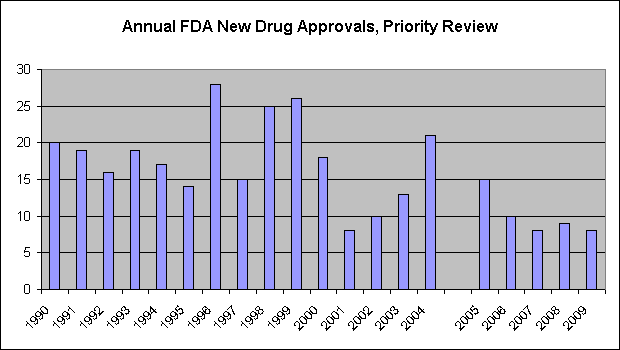May 20, 2011
Michael Leavitt, the Secretary for Health and Human Services under President Bush, touted the Medicare Part D model in an oped in the Washington Post. Leavitt argued that this model, which provided a prescription drug benefit through private insurers, has been effective in providing a wide range of choices to beneficiaries and holding down costs. He notes that the cost of the program has been far lower than the Congressional Budget Office had projected.
While Leavitt is correct in pointing out that the drug benefit has cost much less than had been projected, it is important to note that drug prices in general have risen much less rapidly than was projected when the benefit was introduced in 2006. The obvious explanation for the lower than expected increase in drug prices is a much slower rate of innovation.
In the years since 2005, the Food and Drug Administration has been granting approvals for new drugs that it assigns priority reviews, meaning that they provide a qualitative improvement over existing drugs, at roughly half of the rate that it did in the 1990s. The number of priority approvals averaged just 10 between 2005-2009 compared to 19.9 in the 1990s.

Source: FDA and Knowledge Ecology International.
These new drugs, which supposedly provide much greater medical benefits than existing drugs, are the major factor driving cost increases. Therefore, it is not surprising that a slowdown innovation would be associated with a slower rate of increase in the cost of drugs, including the cost of drugs provided through Medicare Part D.
According to the Center for Medicare and Medicaid Services, we are spending almost 4 times as much on prescription drugs today (adjusted for inflation) as we did in 1990. Given this increase in spending, it would be reasonable to expect the rate of drug development to increase.







Comments